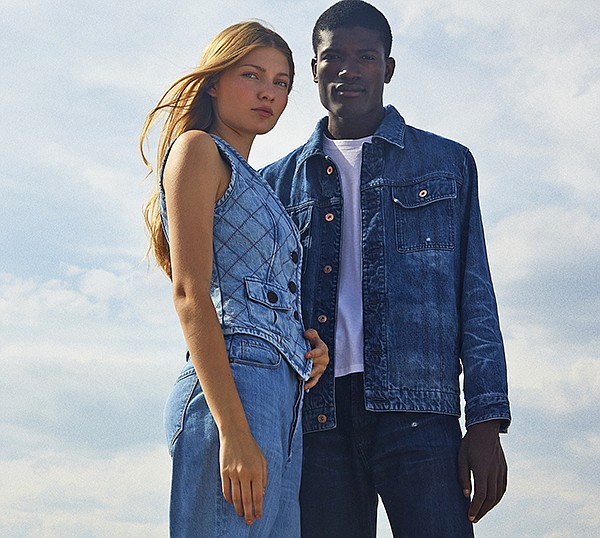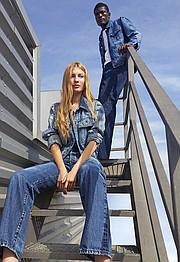JOY OF DENIM
Tencel and Jeanologia Define Simple Pleasures Through the Joy of Denim
Photo Gallery
Tencel and Jeanologia Define Simple Pleasures Through the Joy of Denim
Photos by Paco Esteve
As the world emerged from COVID-19 lockdowns, Lenzing and Jeanologia partnered on the sixth edition of the Sustainable Denim Wardrobe, examining methods of bringing joy to clothing. The mission of the two companies has long been a sustainable approach to manufacturing, with both serving as leaders in the quest for more ecologically sound denim.
“The point is that from the beginning with Tencel the unique selling proposition was always an environmentally responsible fiber, but for many years that fell on deaf ears,” said Michael Kininmonth, business development project manager at Lenzing, which is celebrating the 30-year anniversary of its Tencel Lyocell. “Now, we continue to push the idea of responsible processing, but working with Jeanologia and working with the premium mills that we do, everyone is trying to create best in class in terms of a sustainably responsible commercial collection.”
Designing with joy in mind
The denim leaders posed the question, “What makes you feel good?” to 50 people whose answers candidly described the people, experiences and destinations for which they had longed during the darkest days of the pandemic. The team found that those surveyed found the greatest joy in unexpected, seemingly basic experiences. These included waking in the morning and applying a fragrance, travel, a romantic dinner, exercise, laughing, spending time with loved ones, and exchanging a hug or kiss.
The most popular elements touched upon music and nature, while balance was also a popular theme. Lenzing and Jeanologia wanted to channel these feelings, emotions and experiences into a print created by freelance fashion designer and consultant Betina Grosser, who described the final design as a “dopamine trip.”
“We saw in the print the opportunity to foster an emotional connection and to carry the message throughout the collection. Nature is very important not only as it is but also having the opportunity to do our favorite activities surrounded by it,” said Grosser. “The inspiration for the print is based in surrealism with psychedelic overtones.”
Grosser’s design is featured not only in campaign materials but also on the garments in the Simple Pleasures collection, which relied on Lenzing’s Tencel Lyocell and Jeanologia’s technology. The print is featured in a number of different pieces such as a three-button vest, collared button-up Tencel shirting and reversible waistcoat. Design details from the print were applied to linings, and laser elements were included in areas such as the insides of blazer lapels, along the legs of jeans and on the back of a denim jacket.
“We transferred the concept to the garments from the print itself and through laser details. This micro level is represented by what we call ‘hidden treasures,’ explained Carme Santacruz Zaragozá, creative director at Jeanologia. “They are representations of everyday things lasered into the garments in unexpected places like in the selvage or hidden on the flaps of the garment. Our motto is: ‘Always look on the bright side of life,’ obviously a reference from ‘Monty Python.’ It’s a way of also extending this storytelling through the finishing details.”
The simplicity of sustainability in denim
Through this latest Sustainable Denim Wardrobe, the hope is that the inspiration to create more-timeless pieces will support a circular economy in fashion. By relying on sustainable processes that produce quality clothing, the life cycle of these garments can be extended, thereby reducing waste.
“My hope is that the philosophies behind this collection will encourage designers to create more-responsibly made garments and consumers to give a longer ‘first life’ to such garments as well as being reused in ‘further lives’ by new owners,” said Kininmonth.
The intention behind the Simple Pleasures collection was to create classic silhouettes that rely not on trends but style, according to Santacruz Zaragozá. Lenzing and Jeanologia enlisted textile partners that contributed to the collection. These included Bossa, Cone Denim, Kaihara, Orta Anadolu and Prosperity, while House of U served as a printing partner.
“This is a collection that could be a source of inspiration for creatives and also as a way of saying that we can do beautiful things with meaningful garments and with an approach not just from sustainability in terms of the technical and finishing and materials but also combined with an important concept of storytelling,” explained Santacruz Zaragozá.
Every sourcing element and process was considered for the potential impact on the environment, according to the Environmental Impact Measurement platform. The process measured the amount of water, chemicals and energy used to create the garments, and no resources that would yield a high score were used. Designs were created and reviewed digitally in order to reduce the waste that stems from physical samples. Notions including patches made from cork, laser logos, buttons featuring an eco finish and hangtags comprising recycled materials.
“We need to address sustainability in a holistic view. We have to take care of our footprint and look for materials and processes that are respectful to people and the environment,” said Grosser. “This collection [also] tells a story. It looks for value to have a connection to create connections between people—from the people who took the survey for the collaborative design process to people that are now seeing this process and relating with the project and the garments.”























